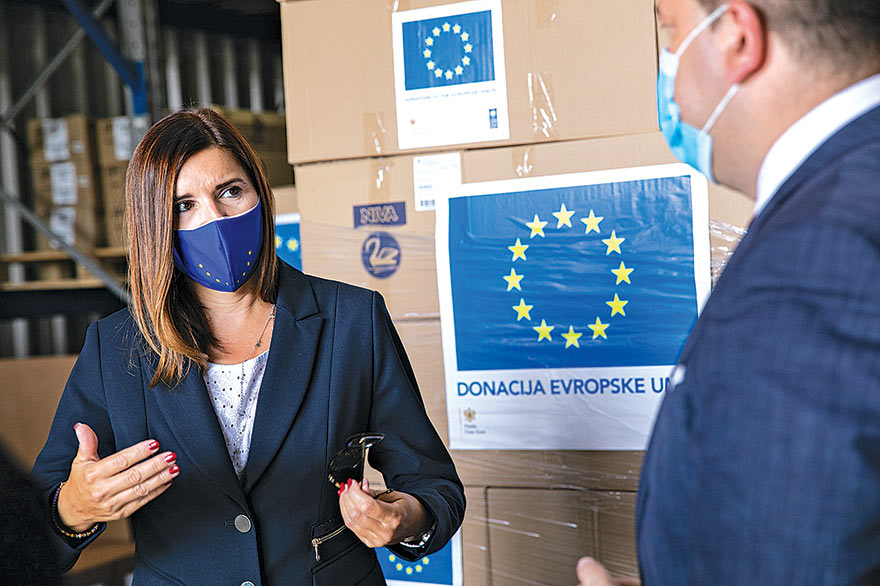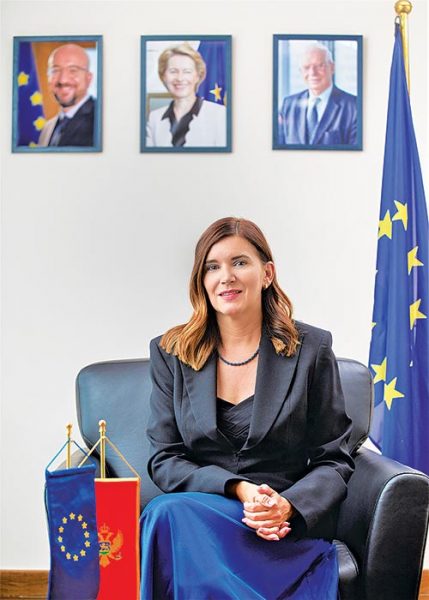For Montenegro, as the most advanced EU membership candidate country, all the opportunities offered by the new methodology for accession are at the country’s fingertips. I have no doubt that Montenegrin society is capable of doing whatever it takes to realise its future in the EU.
The COVID-19 crisis has changed our lives dramatically, putting our core values to the test. However, the European Union has clearly risen to the challenge. In these extremely difficult times, when many EU member states have been hit hard by the unprecedented health and economic crisis, EU citizens haven’t failed to show their solidarity and extend substantial support to their fellow Europeans in Montenegro – says Ambassador Oana-Cristina Popa, head of the EU Delegation to Montenegro.
In the sea of difficult news at the end of this year that more or less all countries across the planet are struggling with, it is good to know that we have friends. In that context, our interlocutor quotes one of the founding fathers of the European Union, Jean Monnet.
Ambassador Popa cites Monnet’s famous statement that “Europe will be forged in crises”.
“I am sure that the European Union and its partners in the Western Balkans will weather this crisis and emerge stronger and more unified. The recent Sofia Summit, which took place on 10th November, reaffirmed that the Western Balkan region is at the heart of Europe, and that its future lies in the European Union. That’s why our engagement has been, and remains, so strong”.
Earlier this year Montenegro opened the last chapter in the EU accession process. What are the next steps that the country should focus on?
– The focus will remain on the ‘fundamentals’ of the functioning of democratic institutions, public administration reform and supporting economic reforms. Rule of law certainly plays a central role in the accession negotiations, and meeting the interim benchmarks set in chapters 23 and 24 is key for advancing in accession negotiations. In this regard, looking ahead, Montenegro should focus, in particular but not exclusively, on the functioning of the judiciary, the fight against corruption and for freedom of expression. In parallel, efforts should be exerted to develop a functioning market economy and improve the competitiveness and long-term growth of the Montenegrin economy by underpinning key structural reforms.
The recent Sofia Summit reaffirmed that the Western Balkan region is at the heart of Europe, and that its future lies in the EU. That’s why our engagement has been, and remains, so strong
While attention is usually directed to the chapters themselves, how would you rate the overall preparedness of Montenegro for membership?
– Montenegro is the most advanced of the candidate countries in the EU integration process. We have learned from previous enlargements that this process has a major transformative power in the societies of the accession countries, which goes far beyond any administrative procedure.
The European Union is a community of values. Therefore Montenegrin society needs to demonstrate its commitment to European values across a range of political, social and economic areas. This can only be done through reforms in those areas, which takes a collective effort of the whole society. There is no other way around it. The more effort Montenegrin society invests in key reforms, especially in the area of the rule of law, the closer it will get to EU accession. Montenegrin citizens already feel very strongly that their country belongs in the EU, therefore the end goal is to see Montenegro as a fully-fledged member of the EU family.
You have said that you and your team will spare no effort to bring the EU closer to Montenegrin citizens and Montenegrin citizens closer to the EU. What do you see as your most important steps in that respect?
– The EU accession process is about putting in place relevant European standards and rules to make sure that citizens have more opportunities, greater prosperity and better safeguards for their rights and freedoms. It is also about creating a safe and reliable environment for entrepreneurs and businesses to promote economic growth. The European Commission’s annual report offers very good and detailed guidance on how to move closer to that goal. Progress on the rule of law is vital, as it underpins all other efforts to improve citizens’ lives and ensure economic growth. While local ownership is key, we will spare no effort to support Montenegro in doing as much as possible, as quickly as possible, and to help Montenegrin citizens and businesses feel the benefits of EU integration already now, without waiting for Montenegro’s actual accession to the EU.
How does the EU assist Montenegro in terms of urgent measures related to the pandemic?
– In order to help Montenegro cope with the COVID-19 crisis, the European Union has provided 53 million euros in grants to support the Montenegrin sectors and individuals worst affected by the crisis.
A significant portion of these non-repayable funds, or 12.5 million euros, has been allocated by the EU as a donation for the health sector, providing Montenegrin health institutions with vital medical appliances and health workers with much-needed protective equipment. The remaining part of the grant funds, or 40.5 million euros, will be paid into the national budget in two tranches, through the Budget Support programme.

The first tranche, of 28 million euros, was disbursed in November. The second one will be paid during the first half of 2021, subject to specific conditions agreed with the national authorities during the preparation of the programme. The most important conditions are that the government provide access to funding to smaller enterprises through grant schemes, as well as social allowances for the most vulnerable sections of the population.
The Montenegrin economy has been hit hard by the pandemic. How will the EU support the country in its efforts to sustain macroeconomic stability and return to a path of growth?
– In addition to the 53 million euros in grants, the European Union has also provided up to 60 million euros in highly favourable loans, in order to help Montenegro limit the economic fallout of the Coronavirus pandemic. This is part of the EU’s Macro-Financial Assistance (MFA) Programme for ten enlargement and neighbourhood partners, worth a total of three billion euros. These highly favourable loans will be disbursed in two tranches. The first tranche of 30.9 million euros, which is unconditional, was already disbursed in October. In order for this assistance to be fully implemented, Montenegro will have to demonstrate continuous respect for core democratic rules, including a multi-party parliamentary system and the rule of law, as well as to continue guaranteeing respect for human rights.
Furthermore, the Economic and Investment Plan, which was presented by Commissioner Várhelyi in early October, provides Montenegro and other Western Balkan countries with considerable financial support. It is important to note that the EU is funding the same type of projects in the region that we are funding in our member states, which cover infrastructure, digital transformation and the green economy. In that way, Montenegro and the region are already receiving the same treatment as they would if they were part of the EU. I hope that Montenegro will make good use of these funds by preparing the necessary projects for a more modern, greener and more prosperous economy. The agreement of the six Western Balkan leaders, reached at the Sofia Summit, to develop the Common Regional Market, based on EU rules and standards, will further increase the attractiveness and competitiveness of the region and help bring it closer to EU markets.
This is the time for all stakeholders to work together to bridge their differences so that Montenegro can earn its place in a community that has been prospering and growing for the past seven decades
What, in that respect, do you see as the positive legacy of the previous administrations, and what are the tasks for the new one?
– Notable progress has been made in many areas, but a lot of work still lies ahead. We therefore expect the new government to speed up political and economic reforms, to make more progress in areas where the country is lagging behind by building on the work of the previous administration. It is important to note that progressing on the EU-accession path requires a fullyfunctioning public administration and the retaining of previously acquired expertise to build on the progress that has been achieved over past years.
This is the time for all stakeholders to work together to bridge their differences so that Montenegro can earn its place in a community that has been prospering and growing for the past seven decades.
How has the new methodology impacted on the overall process?

– By placing more of a focus on the rule of law and fundamental reforms, the new enlargement methodology is making the EU accession process more dynamic and more predictable. It makes it clear to the enlargement countries that good progress in reforms will be rewarded with accelerated integration and phasing-in to individual EU policies, the EU market and programmes. On the other hand, in the case of a lack of progress or backsliding, negotiations can be put on hold, while benefits can be revoked and funding downsized.
For Montenegro, as the most advanced EU membership candidate country, all the opportunities offered by the new methodology for accession are at the country’s fingertips. I have no doubt that Montenegrin society is capable of doing whatever it takes to realise its future in the EU.
What other issues related to EU values does the new government have to embrace?
– Some cross-cutting issues directly underpin the EU’s core values. One of those issues is gender equality.
Montenegro clearly needs to do more to create equal opportunities for women’s participation in social, economic and political life. We have seen a recent surge in domestic violence and are also witnessing negative trends in women’s political participation.
It is not only a matter of respect for the core European values of equality, solidarity and justice, it is also a matter of social and economic progress, as no society can realise its full potential if half of its population is denied equal opportunities.
I therefore encourage all relevant institutions, political and social stakeholders in Montenegro to make every effort to create a safer and healthier environment for all women, with equal opportunities for economic prosperity, political participation and leadership.
The EU will continue to support Montenegro in those efforts.
| FOCUS
Montenegro should focus, in particular but not exclusively, on the functioning of the judiciary, the fight against corruption and for freedom of expression | SUPPORT
We will spare no effort to support Montenegro in doing as much as possible, as quickly as possible, and feeling the benefits of EU integration even before its actual accession | EQUALITY
I encourage all relevant institutions, political and social stakeholders in Montenegro to make every effort to create a safer and healthier environment for all women |
|---|